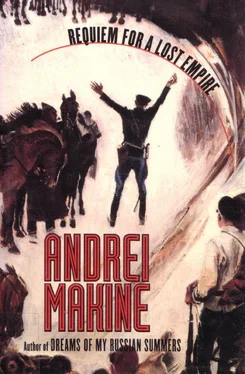
Andrei Makine
Requiem For A Lost Empire
Translated from the French by Geoffrey Strachan
"Wicked men have no songs. How come the Russians have songs?"
Friedrich Nietzsche, TheTwilight of the Idols
"There are only two peoples now. Russia is still barbarous, but it is great… The other young nation is America… The future of the world is there between these two great worlds. Some day they will collide and then we shall see struggles of which the past can give no idea."
– Sainte-Beuve, Cahiers 1847
"The other day I turned up the pages of an address book from before the war. I had to mark crosses and grim notes on every page: 'Exiled… Disappeared… Dead… Killed in battle… Shot by the enemy… Shot by his own side…' "
– Alfred Fabre-Luce, Journal d'Europe 1946-1947
Translator's Note
Andrei' Makine was born and brought up in Russia but Requiem for a Lost Empire, like his other novels, was written in French. Part of the book is set in Russia and the author uses some Russian words in the French text, which I have kept in this English translation: these include agitprop (political propaganda, especially in art or literature); gulag (the system of forced-labor camps in the Soviet Union in the period 1930-55); izba (a traditional wooden house built of logs); kolkhoz (a collective farm); kolkhoznik (a member of the kolkhoz collective); kulak (a peasant farmer, working for his own profit); muzhik (the somewhat contemptuous historic word for a peasant); shapka (a fur hat or cap, often with ear flaps); soviet (an elected local or national council in the former U.S.S.R). The nickname "Shakhmatov" ("the Chess player") derives from the Russian word for chess, shakhmaty .
G.S.
It has always been my conviction that the house that sheltered their love, and later my own birth, was much closer to the night and its constellations than to the life of that vast country they had managed to escape without leaving its territory. The country surrounded them, encircled them, but they were elsewhere. And if, in the end, it discovered them, hidden deep in the woods in the Caucasus, this was the chance outcome of a game of symbols.
For it was a symbolic tie that, in one way or another, linked every inhabitant of the country to the mythical existence of the master of the empire. In their mountain refuge they believed they were free of the cult the country, indeed the entire globe, had built up around an old man who lived out his days consumed by the fear that he had not killed those likely to kill him. Adored or hated, he had a place in everyone's hearts. By day he was acclaimed, when night fell he was cursed in feverish whispers. But these two had the privilege of never bringing his name to mind. Of thinking only about the earth, the fire, the swirling waters of the stream by day Of loving one another, loving the constancy of the stars by night.
Until that moment when the dictator, now almost halfway through the last year of his life, called them to order. Despite his morbid obsessions, irony was no stranger to him: he often smiled through his mustache. They did not wish to come to him? He would go to them. The mountain that towered above the narrow valley
where their house lay hidden reverberated with explosions. Was the construction of a dam that would bear his name being embarked on? An artificial lake created to his greater glory? A power transmission cable set up that he had decided should bring light to remote villages? Was a mineral deposit being uncovered that would be dedicated to him? They only knew that, whatever the nature of these works, the master of the empire was making his presence felt.
After each explosion, fragments of rock shot up above the mountaintop then hurtled down the slope, now sticking fast in the tangles of the underbrush, now parting the smooth surface of the stream. Some of the slabs came to a halt just yards short of the fence that screened the house. Each time they caught sight of a fresh stone missile, the man and woman would leap up, holding out their arms instinctively, as if they could block the bounding fall that snapped tree trunks and tore up broad swathes of the forest floor.
When the explosions fell silent they exchanged looks and had time to say to themselves that their presence had not been discovered, so the place was really safe, or perhaps (they dared not believe this) their clandestine, criminal way of life was finally going to be accepted. The last salvo was unlike the others: it sounded to them like a stray echo that had been delayed. The slab of rock that detached itself from the mountaintop was different too-flat, rounded, and, in a manner of speaking, silent. Its fall was almost soundless. It struck a tree, stood on edge, and revealed its true nature. It was a granite disk, sliced off by the whim of the explosion, rolling faster and faster. The man and woman made no move, mesmerized both by the speed of its rotation and the improbable slowness with which the action was unfolding in front of their eyes. A tree trunk barring the path of this stone wheel was not smashed but sliced, like an arm by a saber. The thickets that might have stopped it seemed to part to let it through. It avoided another tree with the sly agility of a big cat. The dusk veiled some of the stages in its descent-they heard, before seeing it, the dry shattering of the fence.
The disk did not destroy their house. It embedded itself in it, as if in clay, plunging into the heart of it, tearing up the floor and coming to a halt, still bolt upright.
Standing about a hundred yards away from the house, the man lashed out in the direction of the mountaintop, threatening someone with raised fists, and let fly an oath. Then, walking like an automaton, approached their home, which still seemed to be mutely quivering from the impact. The mother, nearer to the door, did not step forward but fell to her knees and hid her face in her hands. The silence had returned to its original essence-the incisive purity of the peaks against a sky still radiant with light. All that could be heard now was the man's halting footfalls. But almost audible in its intensity was the unknowable prayer, silently murmured by the woman.
Making their way into the room, they saw the granite disk, even more massive there under the low ceiling, embedded between the deeply furrowed floorboards. The child's cradle, which hung in the middle of the room (they were wary of snakes), had been grazed and was rocking gently. But the cords had not given way and the child had not awakened. The mother held him tight, still incredulous, then allowed herself to be convinced, heard the life in him. When she looked up, what the father saw in her eyes was the trace of a dread that was no longer related to the child's life. It was the echo of her terrible prayer, the vow she had made, the inhuman sacrifice she had offered in advance, to the one who would keep death at bay. The father did not know the name of this dark and vigilant god. He believed in fate or, quite simply, chance.
Chance willed it that the explosions did not start again. The man and woman, who accepted each day of silence as a gift of God or of fate, were not to know that artificial lakes were no longer needed, since the one to whom they were dedicated had just died.
The news of Stalin's death would be brought to them, three months later, by a woman with white hair, a lithe and youthful step, and eyes that did not judge. The only one who knew their secret refuge, she was more than a friend or relative. She came as night fell, greeted them, and spent several seconds stroking the surface of the granite slab, whose presence in their house no longer amazed the couple and seemed as natural to the infant as the sun at the window or the fresh scent of the clothes hanging up outside the wall. The word "rock" would be one of the first he learned.
Читать дальше











